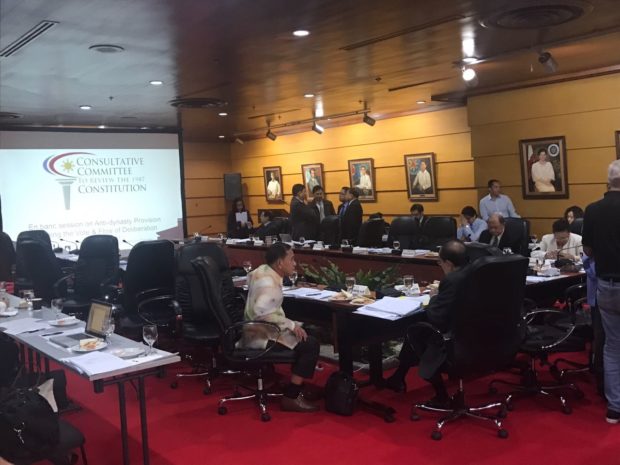The Consultative Commission (Con-Com) on Monday ruled to prohibit the succession of an incumbent official’s relatives, within the first and second degrees of consanguinity and affinity, regardless of the position.
Voting 17-1, the recommendatory body decided that any second degree relative of an incumbent official could not succeed the latter in any elective office, from the barangay level up to the vice president and president posts.
La Salle Dean Julio Teehankee, chair of the panel’s subcommittee on political reforms, saw this as a “victory for the Filipino people.”
“The mere fact that we actually succeeded today in passing this provision, and hopefully it would be part of the final draft and I think it would be part, is already a big victory for the cause of reform because as you all know, for 32 years we have been trying to enact an anti-dynasty provision that is self-executing,” Teehankee said in an interview after the en banc session.
“This is a victory for the Filipino people because finally we have been working on a strong and yet reasonable anti-dynasty provision,” he added.
Despite agreeing on this area, the committee deferred on further deliberating and voting on the provisions on whether the prohibition would also apply to simultaneous running for and holding multiple positions.
“Marami pang issues sa multiple holding and running for a position. What if tatakbo kang president, will you be barred pag tumatakbo yung kamag-anak mo as barangay captain or pag incumbent captain? Will that prevent you from running as president or senator? Ito yung mga dapat tignan,” Atty. Roan Libarios, also a member of the panel, said.
The committee agreed to continue discussing the issues on Tuesday during its en banc session.
Con-Com chair and retired Chief Justice Reynato Puno has likewise underscored the importance of the anti-political dynasty provision in the Constitution that they are drafting.
“Napakaimportante nito dahil pagka nag-federalize tayo marami tayong kapangyarihan na ibibigay dun sa constituent units or states or regions. Hindi natin pwede ibigay ang mga kapangyarihang ito kung itong mga regions ay pinamumugaran ng political dynasties,” he said.
Pressed if he is confident that Congress would accept their recommendations, Puno answered: “It’s not a matter of confidence, we’ll do what we think is right bahala na ang taong bayan.”
Late last year, President Rodrigo Duterte formed the committee through an executive order to “study, conduct consultations, and review” the provisions of the 30-year-old Constitution, in line with the government’s plan to shift to a federal form of government.
He later appointed its 20 members, who are legal luminaries and mostly federalism advocates.
The committee is expected to present after six months its proposals to Duterte, who will then submit it to Congress. Congress may or may not accept its recommendations.
RELATED STORIES:
No ban: Con-Com seeks regulation of political dynasties
Con-Com votes to adopt federal-presidential gov’t system
